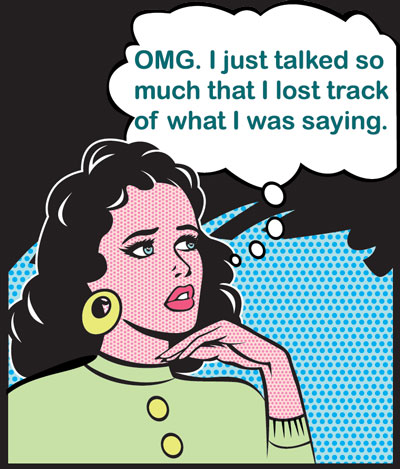Chatty Challenged
A long time ago I had a neighbor named Nancy, and she had a daughter named Rebecca. Rebecca was a lovely girl; 12 years old, bright, funny, and sincere. She was also an only child, and had been raised by smitten parents who believed that everything Rebecca said was publication-worthy. One evening I hosted a dinner party and invited my neighbors, including Rebecca. The evening was a disaster.
Rebecca dominated the entire dinner with her 12-year-old conversation. Her parents had no skills (or interest, apparently) for redirecting her, and Rebecca was so unaccustomed to being redirected that the gentle clues the rest of the party gave her went unnoticed.
I knew better than to point out to Nancy her daughter's faux pas, because that wasn't the sort of thing Nancy wanted to hear. But a few days later, as I sipped a cup of coffee and read the paper at our corner coffee shop, Rebecca came in on her way home from school. She came over to my table, sat down, and said, almost immediately, "I talked too much at your house the other night didn't I?" Her question was so sincere and her anxiety was real, so I decided to give her the honesty she was seeking. "Yes," I said, "I'm afraid you did Rebecca." Her eyes welled up with tears and she said, "I knew it. I said something to my mom and she said I was fine. But I felt like I was talking too much."
"Why did you feel the need to talk so much?" I asked her. She wasn't quite sure herself, but as she reviewed that night it was clear that she felt she was somehow supposed to be talking, and then once she started she couldn't stop.
How this Relates to Sales Skills
I have observed this same dynamic repeatedly when watching business people try to pitch something. Whether they are sales professionals pitching their products or a business owner pitching his business to investors, sometimes they get started talking and they just can't stop. The people being pitched start giving subtle cues; looking down at their paper or hands instead of at the speaker, or starting to look over the shoulder of the speaker, or looking uncomfortable or as if they are becoming impatient. Those cues often (way too often) go unheeded. A cycle of desperation sets in, as the pitcher tries ever harder to get a response, and the pitchee tries to make it all stop.
If you are squirming in your chair feeling the familiarity of this scene, you're not alone. Now let's talk about how to make sure it never happens to you (again).
When you approach someone to make a sale, the typical response will be for the recipient of your pitch to sit back and listen to what you have to say. They may only give you 90 seconds, but during those 90 seconds they want you to do the work. This puts huge pressure on the seller to say the right things, in the right way, and in the right order. This pressure causes a specific flavor of fight-or-flight to set in; it's called talk-or-clam-up. Neither of those instinctual reactions will get you where you want to go.
Every successful sale starts with a conversation, and every successful sales person starts with questions. Questions like:
- What are you trying to accomplish?
- What are your strategic objectives?
- What interested you enough to take this meeting with me in the first place?
- Is there a specific business need you think I may be able to help you with?
- If you could solve a business problem right now related to (whatever it is you sell), what would that problem be?
These questions and questions like them are conversation starters. Once the conversation is rolling, your curiosity should lead you to the other questions that need to be asked. Is it starting to sound like the person being sold to should do more of the talking than the person doing the selling? Well, you're right - that's precisely what is supposed to happen!
The more genuinely interested you are in the person to whom you wish to sell, the more lively and informative the conversation will be for both of you. It is conversations like these that lead to sales - not pitches.
The next time Rebecca came over to dinner (and I made sure it was sooner rather than later), she practiced the skills we had discussed at the coffee shop. She politely asked questions when it was appropriate for her to do so, and she listened carefully to the responses and the conversation that ensued. As she hugged me goodnight she whispered in my ear, "That was SO much more fun! Thank you!"
The next time you feel pressured - compelled - to talk, take that as a cue. Stop. Take a deep breath. Then summon all your curiosity about and interest in the person with whom you are speaking. Ask a question. Ask another. Engage them. You will be far more likely to make the sale. And it will be SO much more fun.











